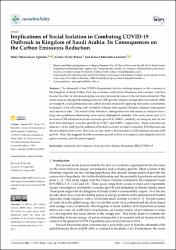Implications of Social Isolation in Combating COVID-19 Outbreak in Kingdom of Saudi Arabia: Its Consequences on the Carbon Emissions Reduction
Özet
The aftermath of the COVID-19 pandemic has two striking impacts on the economy of
the Kingdom of Saudi Arabia. First, the economic contraction of business and economic activities.
Second, the effect of oil prices dropping as energy demand decreases in the international market. This
study seeks to underpin the linkage between GDP growth, oil price, foreign direct investment (FDI),
air transport, social globalization and carbon dioxide emission by applying time-series econometrics
techniques of the following: fully modified ordinary least squares, dynamic ordinary least squares
and canonical tests. The results of the Johansen cointegration test and empirical analysis trace a
long-run equilibrium relationship between the highlighted variables. Our study shows that a 1%
increase in FDI attraction increases economic growth by 0.004%; similarly, air transport and oil rent
from KSA increased economic growth by 0.547% and 0.005%, respectively. These outcomes are
indicative of the GDP growth ambition of the KSA economy in order to intensify FDI attraction and
the air transportation sector. However, we also observe that increases in CO2 emission increase GDP
growth. Thus, this suggests that the economic growth in KSA is not green, indicating the need for
green economic growth pursuit targets.
Cilt
13Sayı
16Bağlantı
https://hdl.handle.net/11363/5164Koleksiyonlar
Aşağıdaki lisans dosyası bu öğe ile ilişkilidir:


















